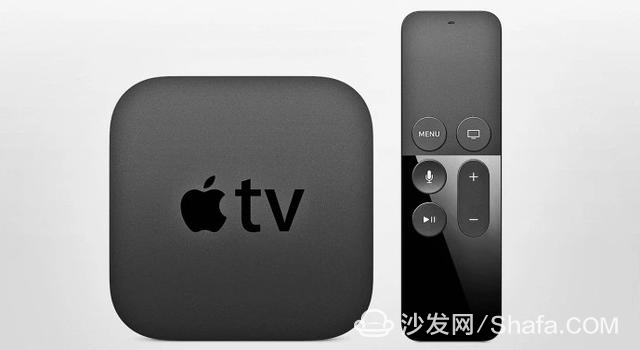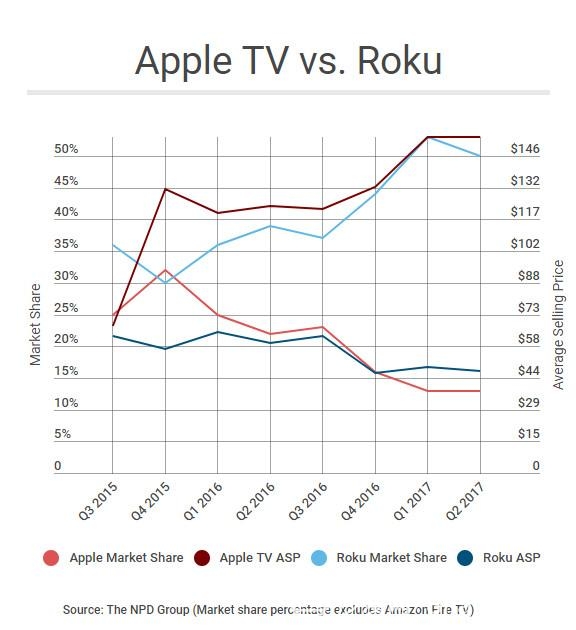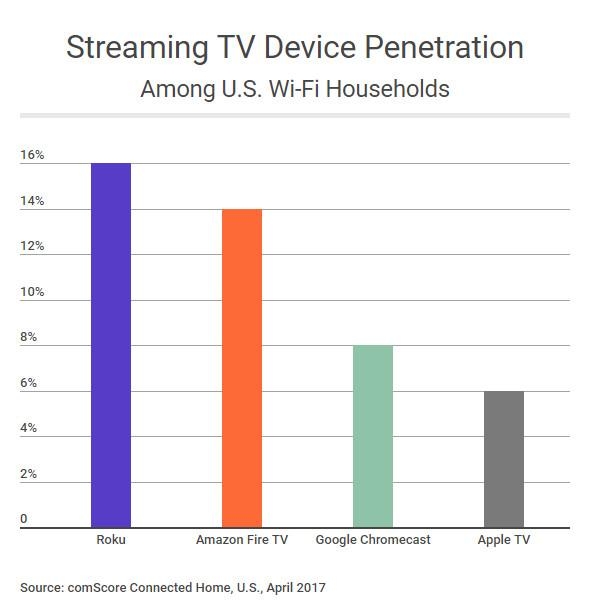At the conference yesterday morning, Apple launched the Apple TV 4K. While Apple revolutionized the digital music industry and redefined mobile phones and tablets, it has struggled in the television space. The company’s approach of "advanced hardware supporting differentiated software" hasn't worked well in this sector. According to an article from FastCompany, Apple's challenge lies in the fact that television is a content-driven industry where users don’t demand high-end hardware for streaming services. As a result, Apple’s pricier hardware doesn’t appeal to many consumers. This report was compiled by 36Kr.
 To better understand Apple TV's struggles, it's helpful to look at Roku Express, a budget-friendly set-top box. Compared to Apple TV, the $30 Roku device feels outdated. It has a slow interface, uses single-band Wi-Fi, and relies on bulky infrared remotes. Even the more affordable Streaming Stick version only costs $20 more but solves these issues, making it hard to justify buying Apple TV instead.
Roku, however, has not faced sales issues with its most affordable devices. In its recent IPO filing, Roku reported a 37% year-over-year increase in device sales during the first half of the year. According to NPD Group, Roku holds over two-thirds of the U.S. market for devices priced under $50, with an average selling price of just $47.
Apple TV, priced at $150, is three times more expensive than the average Roku device. Although it outperforms the Roku Express in terms of performance and polish, the user experience when watching content like Netflix isn’t much different. This might explain why Apple TV’s market share is being squeezed by Amazon and Roku. Consumers aren’t motivated to pay more for similar features.
To better understand Apple TV's struggles, it's helpful to look at Roku Express, a budget-friendly set-top box. Compared to Apple TV, the $30 Roku device feels outdated. It has a slow interface, uses single-band Wi-Fi, and relies on bulky infrared remotes. Even the more affordable Streaming Stick version only costs $20 more but solves these issues, making it hard to justify buying Apple TV instead.
Roku, however, has not faced sales issues with its most affordable devices. In its recent IPO filing, Roku reported a 37% year-over-year increase in device sales during the first half of the year. According to NPD Group, Roku holds over two-thirds of the U.S. market for devices priced under $50, with an average selling price of just $47.
Apple TV, priced at $150, is three times more expensive than the average Roku device. Although it outperforms the Roku Express in terms of performance and polish, the user experience when watching content like Netflix isn’t much different. This might explain why Apple TV’s market share is being squeezed by Amazon and Roku. Consumers aren’t motivated to pay more for similar features.
 At the September 12 press event, Apple introduced the 4K HDR Apple TV, which should help address compatibility issues with competitors. However, it's unclear if this new model will significantly boost its market share. According to NPD, devices priced above $75, including Roku's Premiere+ and Ultra 4K HDR models, accounted for just 22% of total sales.
Apple must now compete with low-cost alternatives, a common strategy in tech, but one it has traditionally ignored. The success of its iPhone, iPad, and Mac business—based on advanced hardware and differentiated software—has not translated well to the streaming TV market, where content is king. Without major price cuts or content breakthroughs, Apple TV may continue to struggle.
At the September 12 press event, Apple introduced the 4K HDR Apple TV, which should help address compatibility issues with competitors. However, it's unclear if this new model will significantly boost its market share. According to NPD, devices priced above $75, including Roku's Premiere+ and Ultra 4K HDR models, accounted for just 22% of total sales.
Apple must now compete with low-cost alternatives, a common strategy in tech, but one it has traditionally ignored. The success of its iPhone, iPad, and Mac business—based on advanced hardware and differentiated software—has not translated well to the streaming TV market, where content is king. Without major price cuts or content breakthroughs, Apple TV may continue to struggle.
 Roku isn't the only player in the low-cost hardware space. In 2014, Amazon launched the Fire TV Stick for $40, which had some performance limitations compared to its $100 Fire TV box. Despite this, it sold quickly. Parks Associates reported that within a year, Amazon's Fire TV Stick sales tripled, with 81% of U.S. broadband households using it.
This trend has hurt Apple’s TV business. According to Parks Associates and ComScore, Apple TV ranks fourth in the U.S., behind Roku, Amazon Fire TV, and Google Chromecast.
Roku isn't the only player in the low-cost hardware space. In 2014, Amazon launched the Fire TV Stick for $40, which had some performance limitations compared to its $100 Fire TV box. Despite this, it sold quickly. Parks Associates reported that within a year, Amazon's Fire TV Stick sales tripled, with 81% of U.S. broadband households using it.
This trend has hurt Apple’s TV business. According to Parks Associates and ComScore, Apple TV ranks fourth in the U.S., behind Roku, Amazon Fire TV, and Google Chromecast.
 Apple isn’t just facing competition—it's also hurting itself. In 2015, the fourth-generation Apple TV was priced higher than all competing products. At the time, Apple held 32.3% of the U.S. streaming device market (excluding Amazon). Since then, its market share dropped to 13.5%, partly due to discontinuing the cheaper $69 model.
While Apple argues it doesn’t need to chase market share, focusing instead on the high-end ecosystem, the reality is that the high-end market isn’t as strong as it once was. Apple’s CFO noted that holiday sales for Apple TV declined in 2016, affecting the “other†product category, which includes iPods and standalone Mac monitors.
Despite this, Apple continues to invest in content, aiming to redefine television. It has partnered with movie studios for 4K HDR purchases and plans to spend $1 billion on original content. But with most viewers using cheaper devices, Hollywood has little incentive to change.
Ultimately, Apple faces a tough decision: either compete on price like Roku, Google, and Amazon, or accept lower market share and reduced influence. Current trends suggest which path Apple may take. For those interested in smart TVs and streaming boxes, check out Smart TV/box information network sofa butler (http://), China's leading platform for TV box and smart TV news, reviews, and updates.
Apple isn’t just facing competition—it's also hurting itself. In 2015, the fourth-generation Apple TV was priced higher than all competing products. At the time, Apple held 32.3% of the U.S. streaming device market (excluding Amazon). Since then, its market share dropped to 13.5%, partly due to discontinuing the cheaper $69 model.
While Apple argues it doesn’t need to chase market share, focusing instead on the high-end ecosystem, the reality is that the high-end market isn’t as strong as it once was. Apple’s CFO noted that holiday sales for Apple TV declined in 2016, affecting the “other†product category, which includes iPods and standalone Mac monitors.
Despite this, Apple continues to invest in content, aiming to redefine television. It has partnered with movie studios for 4K HDR purchases and plans to spend $1 billion on original content. But with most viewers using cheaper devices, Hollywood has little incentive to change.
Ultimately, Apple faces a tough decision: either compete on price like Roku, Google, and Amazon, or accept lower market share and reduced influence. Current trends suggest which path Apple may take. For those interested in smart TVs and streaming boxes, check out Smart TV/box information network sofa butler (http://), China's leading platform for TV box and smart TV news, reviews, and updates.




35 Kv Transformer,Low Noise 35 Kvoil-Immersed Transformer,Oil Immersed Transformers With High Load Capacity,High Voltage Insulated Oil-Immersed Transformer
Tianhong Electric Power Technology Co., Ltd , https://www.tianhongtransformer.com